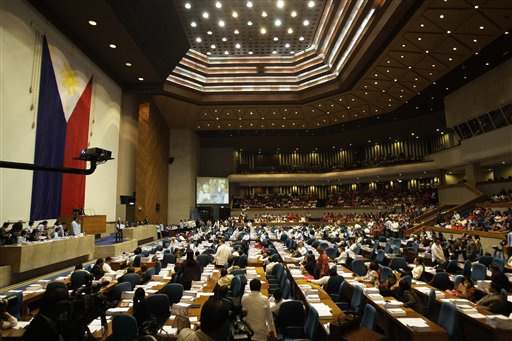Solons doubt Congress had truly given up pork
Lawmakers on Monday voiced doubts that the Congress had truly given up its discretion on the use of pork barrel funds in the debate on the pork during plenary deliberations on the proposed 2014 national budget in the House of Representatives.
The pork barrel is a graft-ridden fund that finances pet projects of lawmakers aimed at winning votes.
The House has excised the lump sum P25.2-billion Priority Development Assistance Fund (PDAF) and Vice President Jejomar Binay’s P200-million pork from the P2.268-trillion national budget for next year and realigned these to six executive departments.
The PDAF and Binay’s pork would go to the Commission on Higher Education (P2.69 billion); Department of Education (P1.022 billion); Department of Health (P3.69 billion); Department of Social Welfare and Development (P4.71 billion); Department of Labor and Employment (P3.69 billion); and Department of Public Works and Highways (P9.654 billion).
Lawmakers could refer their beneficiaries of scholarships, medical assistance and the like to the concerned departments. As for infrastructure projects, they could propose up to three projects each that would be included in the DPWH budget.
Article continues after this advertisementSafeguards
Article continues after this advertisementRep. Isidro Ungab, chair of the appropriations committee, insisted that the pork barrel was gone. He pointed out that the role of Congress stopped with the approval of the budget and that it would no longer have any say on its implementation.
Ungab also said there were safeguards on the use of the funds in the agencies, such as the prohibition on the downloading of these funds to nongovernment organizations, the requirement for lawmakers to recommend only projects in their districts, third-party monitoring and the public disclosure on the details and progress of the projects, including an evaluation report.
But ACT Teachers Rep. Antonio Tinio, during interpellations, said that while the PDAF, the official name of the pork barrel, was no longer in the budget, the pork barrel was alive and well.
Tinio said the scheme in which lawmakers would be able to recommend that departments help their constituents would just politicize the delivery of social services, since legislators would still be able to exert influence on the use of the funds.
Ban recommendations
According to him, there should be a prohibition on public officials making recommendations that would lead to preferential treatment for certain citizens over others.
“This whole culture of recommendation and referrals from high-ranking public officials politicizes the delivery of basic social services,” he said.
As for infrastructure that lawmakers can identify and include in the budget, Tinio said these projects were unlikely to be scrutinized given the tradition of parliamentary courtesy.
“Even though individual discretion has been moved from the budget-execution phase to the budget-authorization phase, there will still be limited, if not zero, oversight exercised by this House as a whole over the nominations,” he said.
Still pork
“As far as this representation is concerned, it’s still pork,” Tinio added.
Also sharing Tinio’s view was Gabriela Rep. Luz Ilagan, who said in a statement that the 2014 budget “is just as greasy and teeming with pork.”
“The mere fact that legislators still have the discretion to choose which projects to endorse is proof that legislators’ pork barrel is very much alive,” Ilagan said.
Entitlement
Bayan Muna Rep. Neri Colmenares also said “entitlement to nominate is what transforms a fund into pork.”
But Ungab said that with regard to lawmakers providing recommendation letters to their beneficiaries, this was not influence-peddling but rather pure assistance to constituents, especially those who may otherwise be intimidated by the thought of going to agencies.
“If your intention is to help and not to impose upon [the departments], why would we think that you are unduly influencing accountable persons? And the guidelines are also there,” he said.
As for lawmakers recommending infrastructure projects to be included in the budget, he said this was part of Congress’ exercise of its power to amend the budget.
This is different from the previous practice when the PDAF was still alive, since the lawmakers’ discretion is only exercised during budget authorization. They would no longer have any say on when a project is implemented, he added.
While the PDAF and the Vice President’s pork have been scrapped, President Aquino’s own lump sum funds such as his calamity, contingency and social funds remain in the budget.
Contingency funds
Ungab once again countered proposals to abolish these during the deliberations yesterday.
He said the calamity and contingency funds were needed on standby in case of emergencies, such as typhoons and repatriations of overseas Filipino workers, which cannot be predicted.
“I believe these are items we cannot just let go,” Ungab said.
As to the President’s social fund, he said this was beyond the purview of budget authorization, as there were specific laws that covered its use. He said what Congress could do was to pass another law that would amend the previous ones.
Originally posted at 07:58 pm | Monday, September 16, 2013
